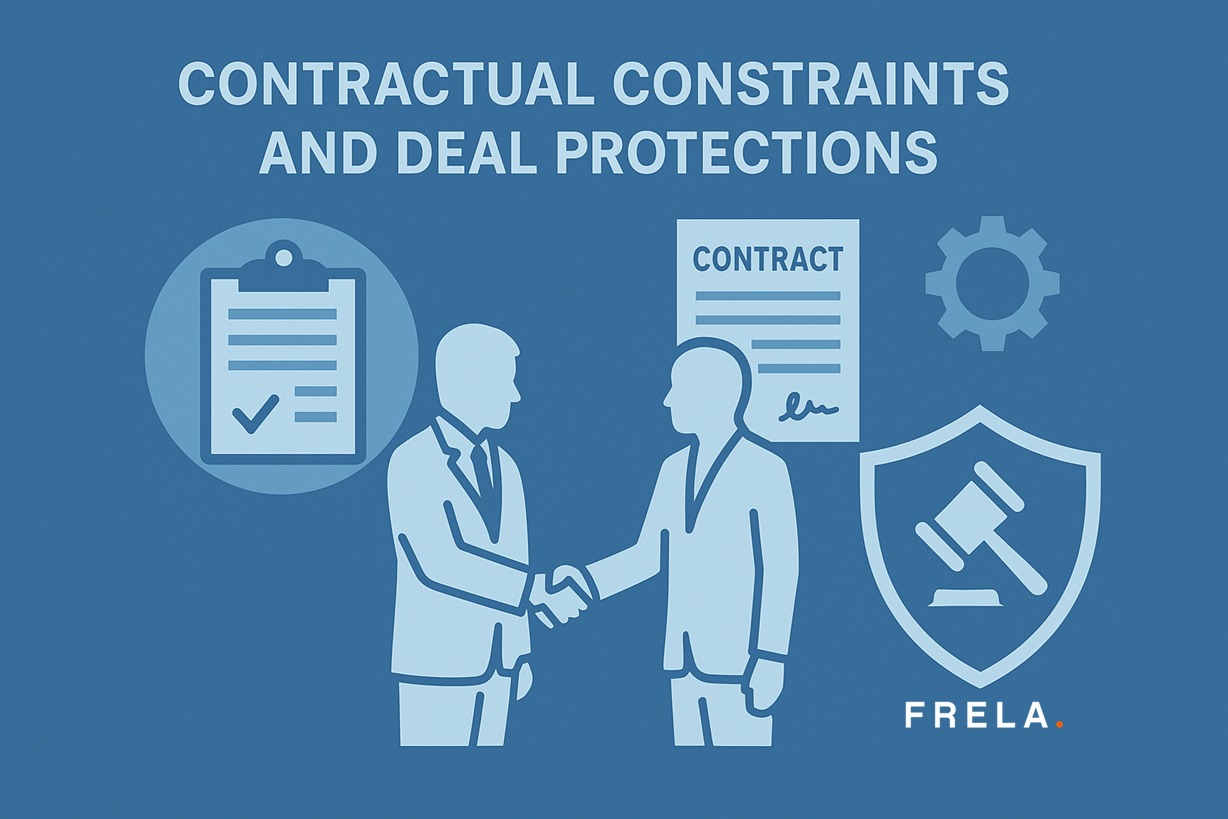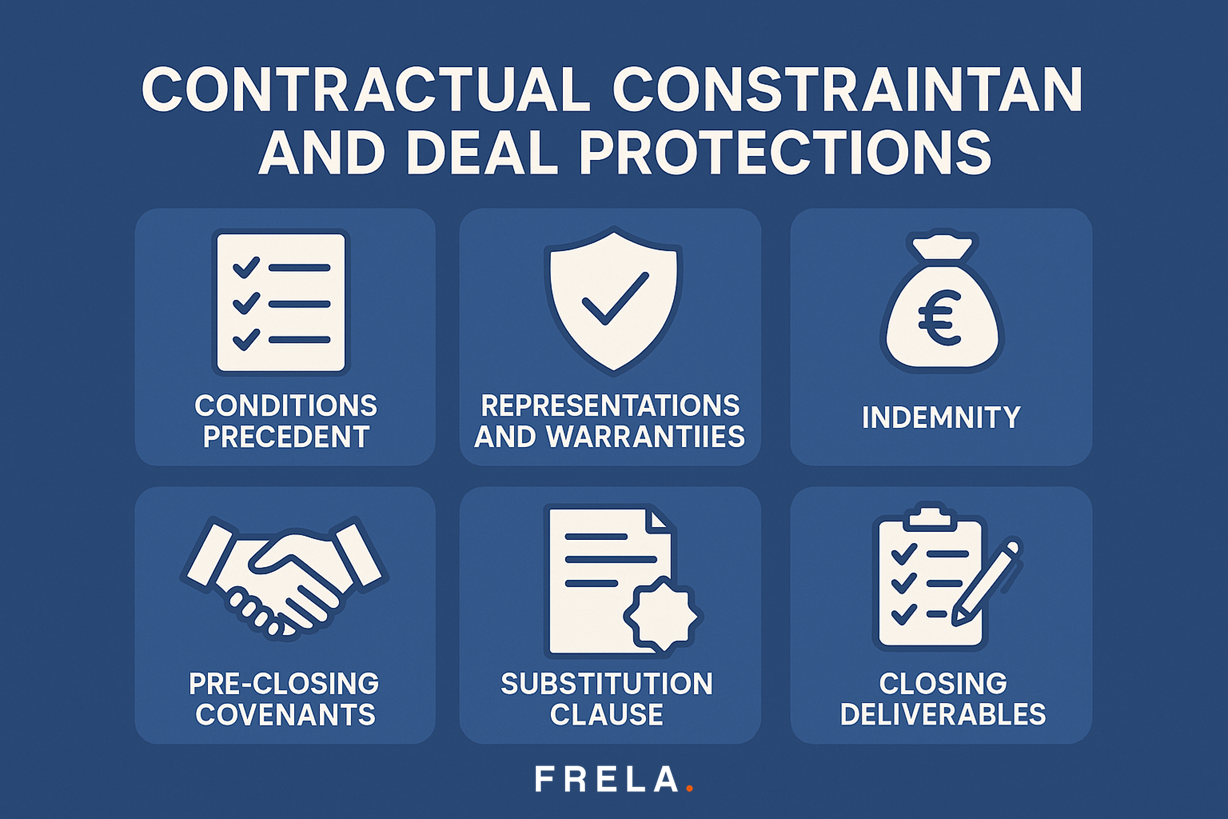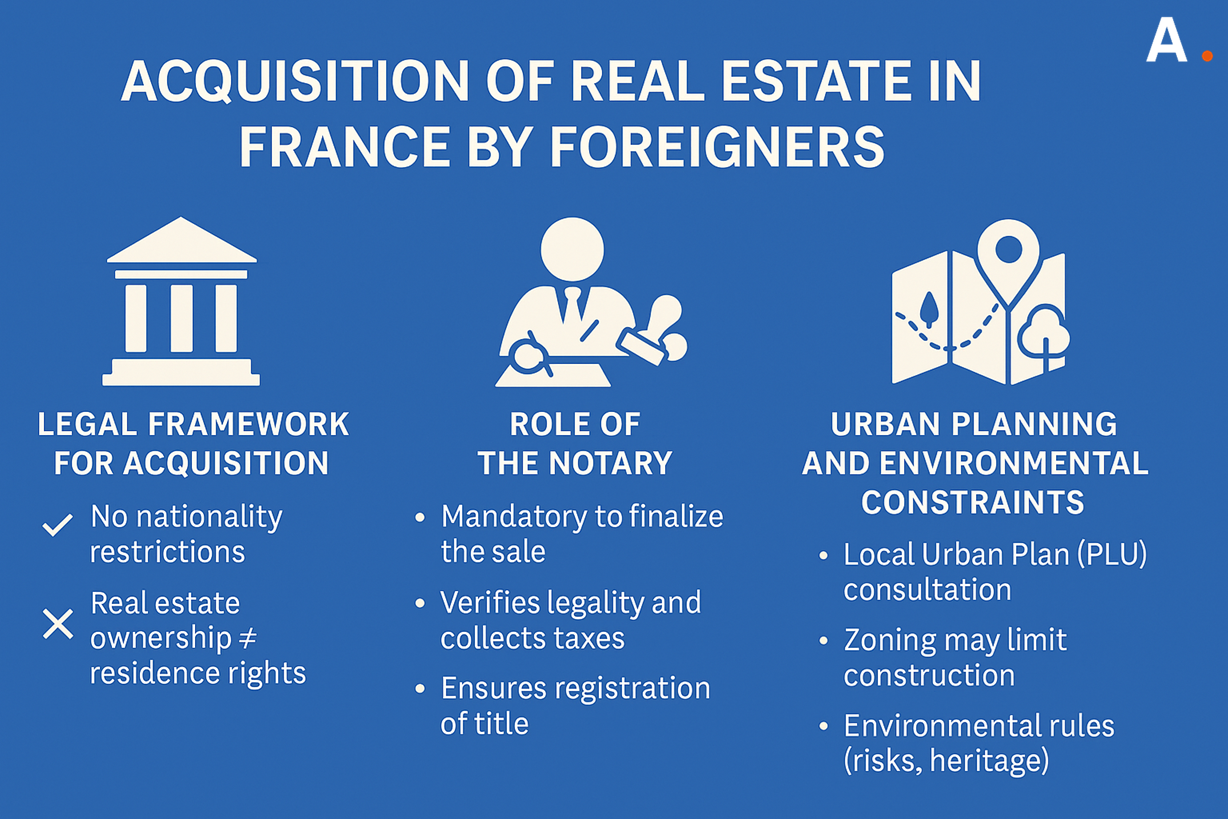Contractual constraints and deal protections
Given the legal, tax, and regulatory complexities, the acquisition contract (whether a Share Purchase Agreement for a share deal or an Asset Purchase Agreement for an asset deal) must be carefully crafted with appropriate conditions, warranties, and indemnities. Some important contractual and procedural points include:


Conditions Precedent (Conditions Suspensives):
It is standard to include certain conditions that must be satisfied before the buyer is obliged to close the deal. For a foreign investor, a key condition is obtaining all necessary regulatory approvals – notably Foreign Investment approval as discussed above, and any antitrust clearance if the size of the transaction triggers French or EU merger control (France has a mandatory merger control regime for qualifying deals). If real estate assets are being acquired directly, conditions may include waiver or expiration of any statutory preemption rights (e.g. the local municipality’s right of first refusal) or obtaining any required waivers from co-owners (if, say, the property is co-owned and co-owner consent is needed). Another common condition is shareholder approval if either party needs consent of a parent or their own board. In some deals, especially involving sensitive real estate like sites requiring renovation, the buyer might insist on a condition that no material adverse change has occurred to the properties (including no major damage or new legal encumbrance) in the interim. All such conditions should have deadlines after which if not fulfilled, parties can terminate the deal (or waive the condition if permissible and desired).
Representations and Warranties:
The SPA will contain extensive representations and warranties by the seller about the company. For a real estate-heavy target, special reps focus on property title, condition, and compliance. Typical warranties cover: ownership of each property by the company free of liens (or disclosing any security interests), compliance with zoning and building laws, absence of undisclosed leases or occupants, that all required permits (building permits, operating licenses, environmental permits) are in order, and that no eminent domain or expropriation procedures are ongoing. If environmental issues are a concern, specific reps about known contamination or compliance with environmental law are often requested. The seller also usually warrants the validity of material contracts (like major tenant leases or equipment leases) and that there are no defaults. From the buyer’s perspective, these warranties serve two purposes: to elicit information (full disclosure from seller) and to allocate risk (if a warranty is untrue, the buyer can seek damages or indemnification).
Garantie d’actif et de passif (Indemnities):
Under French practice, beyond the reps & warranties, share purchase agreements often include a “garantie d’actif et de passif”, which is essentially an indemnity from the seller to the buyer covering liabilities that originate prior to closing but come to light afterwards. This functions similarly to an indemnification for breach of warranties, but it can sometimes be drafted as a separate guarantee covering specific categories of liabilities (e.g. any undisclosed tax debts, litigation, or environmental remediation costs relating to the pre-closing period). In essence, the seller guarantees the state of the company’s assets and liabilities as of closing. If something was not revealed and turns out to burden the company later (an “active” or “passive” element), the buyer can be indemnified. For foreign buyers unfamiliar with French mechanisms, this is analogous to a comprehensive indemnity, often subject to negotiated limitations (caps, thresholds, time limits). Given the broad liability inheritance in a share deal, such guarantees are vital – as noted, the buyer will inherit “all liabilities of the target company… against a guarantee of assets and liabilities within the SPA”.
W&I Insurance:
In larger cross-border deals, it’s increasingly common to use warranty and indemnity (W&I) insurance. This insurance covers the buyer (or sometimes the seller) against breaches of reps and warranties, effectively shifting risk to an insurer. This can be useful if the seller (e.g. a private equity fund) insists on a clean exit with minimal escrow or if the buyer wants extra comfort beyond the credit of the seller. The policy will have its own exclusions (environmental matters are sometimes excluded or sub-limited), so even with insurance, key areas like environmental or tax may still require specific indemnities.
Substitution Clause (Clause de Substitution):
A French SPA often contains a buyer substitution clause allowing the initially signing buyer (often a holding company or special acquisition vehicle) to substitute another affiliated entity to take title to the shares/assets at closing. This is extremely useful for foreign groups – for example, the group’s main holding might sign the agreement, but before closing they may incorporate a new French subsidiary to actually carry out the acquisition. A well-drafted substitution clause permits this assignment of rights without needing the seller’s further consent, provided conditions in the clause are met. The French Supreme Court has upheld that when such a clause is exercised, the substitute entity becomes the purchaser and the original signatory is released from obligations. Foreign investors should ensure such a flexibility is built in, as it provides structuring freedom (especially if tax or regulatory reasons call for using a different vehicle last-minute).
Pre-closing Covenants:
The period between signing and closing is often when regulatory approvals are pending. The SPA will include covenants that the target business be carried on in the ordinary course and that the seller will not undertake major actions regarding the real estate (no disposals, no new leases, no new mortgages, etc.) without buyer consent. This ensures the properties remain in the same state as evaluated, by the time of closing.
Closing Deliverables and Formalities:
The closing of a share deal involving real estate-heavy companies might include specific deliverables: e.g., up-to-date mortgage and encumbrance certificates from the land registry for each property, evidence of required third-party consents (if any leases or contracts required landlord, tenant, or governmental consents for the change of control or assignment, those consents should be delivered), and proof of insurance coverage continuation. In an asset deal, the notarial deeds for each real property will be signed at closing, and there may be additional formalities such as updating insurance, utility contracts, and notifying tenants of the change of landlord.
Throughout the contract negotiation, both parties should also consider the timeline and drop-dead dates. For instance, if FDI approval is a condition, how long will they wait for it? If approval is denied, does the buyer have any recourse or does the deal simply terminate? These scenarios should be addressed to avoid disputes later.
Finally, governing law and dispute resolution: An acquisition of a French company with French assets is almost always governed by French law (particularly if it’s a share deal – shares of a French company are typically transferred under French law formalities). This is practical since many aspects (employment, real estate, regulatory) are rooted in French law. The parties can choose arbitration or French courts for dispute resolution; larger international deals sometimes opt for ICC arbitration, whereas purely domestic transactions might rely on the French court system. Foreign buyers should be advised on the implications of these choices.
About the Author :
Business lawyers, bilingual, specialized in acquisition law; Benoit Lafourcade is co-founder of Delcade lawyers & solicitors and founder of FRELA; registered as agents in personal and professional real estate transactions. Member of AAMTI (main association of French lawyers and agents).
FRELA : French Real Estate Lawyer Agency, specializing in acquisition law to secure real estate and business transactions in France.
Paris, 15 rue Saussier-Leroy, Paris
Bordeaux, 24 Rue du manège, 33000 Bordeaux
Lille, 40 Theater Square, 59800 Lille





